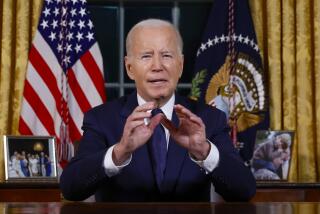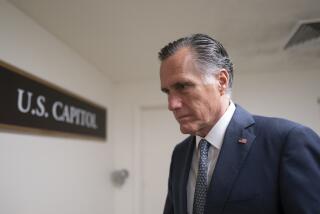Romney facing test on war and peace
- Share via
DELRAY BEACH, FLA. — In the 16 months that he has been running for president, the thrust of Mitt Romney’s policy toward Afghanistan has been this: He would hew to President Obama’s timeline to withdraw U.S. troops by the end of 2014, but he would part ways with the president by giving greater deference to the judgment of military commanders.
Beyond that, Romney has revealed little about what his guiding principles would be for committing U.S. troops in conflicts around the world or what elements have shaped his thinking about Afghanistan -- subjects likely to be broached in Monday’s foreign policy debate.
His caution about delineating specific positions may rest on both a family history complicated by a prior war, and his imperative to balance the needs of a party that values displays of strength overseas with those of voters who are weary of war.
Like Obama, Romney never served in the military and would have little foreign policy experience to speak of upon assuming the presidency. But he came of age in the midst of the Vietnam War, receiving deferments from the draft as a student and later as a Mormon missionary. As a freshman at Stanford, Romney joined a counter-protest against antiwar demonstrators -- a stance in line with that of his father, George Romney, a three-term Michigan governor.
Romney was abroad on his mission, however, when his father shattered his 1968 presidential candidacy by telling a Michigan television host he’d “had the greatest brainwashing that anybody can get” from military generals during a Vietnam trip two years earlier.
Jonathan Moore, who was George Romney’s chief advisor on Vietnam, said in an interview that the elder Romney was “too blunt and too rigid” but “willing to get into trouble for his beliefs,” adding that “it was the wrong time to indulge that.”
The younger Romney has given Americans only a vague sense of the direction he might take as commander in chief.
He has steered away from in-depth critiques of the muscular approach of President George W. Bush in Iraq and Afghanistan and discussions about how his two visits to Afghanistan in 2006 and 2011 shaped his thinking on that conflict.
He has criticized Obama for not doing more to secure stability in Syria and Libya, but he has not said whether he would consider committing U.S. troops as part of a peacekeeping force in either nation.
Romney has also said he would take a tougher line than Obama on preventing Iran from obtaining a nuclear weapon.
About 60% of Americans favor a rapid withdrawal of troops from Afghanistan, according to a recent Pew Research Center study. Nearly two-thirds of those surveyed also said the U.S. should be less involved in the Middle East.
Facing that political reality, Romney has focused on policy around the edges -- needling the president over past decisions, for example, rather than addressing the security concerns on the ground in Afghanistan.
He faulted Obama for announcing “a precise date” for withdrawal based on “a political calendar,” but does not quibble with his timeline. He has said the president made a mistake by removing surge troops in Afghanistan during the midst of the fighting season in September instead of waiting until November.
And he has argued for staying the course there, without saying much about what he envisions for that country when troops leave. When confronted by a tearful Ohio mother of a soldier who told him that there was no clear mission for U.S. troops in Afghanistan, Romney answered that he would bring the troops home as soon as the “mission is complete.”
He defined the mission as one in which Afghanistan would have a security force that was “capable of maintaining the sovereignty of that nation,” but he said the U.S. would not be able to “hand on a silver platter their freedom.”
“They will have to fight for that, earn it, keep the Taliban from taking it away from them. But we’ve given them that opportunity,” he said at that Dayton town hall event. “We’re going to finish the job of passing it off to them and bring our troops home as soon as humanly possible.”
Romney’s campaign has posted more ambitious goals for Afghanistan on its website: eliminating Al Qaeda from the region, degrading the Taliban and other insurgent groups, and ensuring “that Afghanistan will never again become a launching pad for terror.”
His most frequent talking point has been that he would base his decisions about withdrawing troops “on conditions on the ground as assessed by our military commanders.”
Asked last year whether he would adhere to Obama’s 2014 timeline, Romney told PBS’ Judy Woodruff that he “would listen to the generals” and, based on their judgments, “of course pursue that course.” When Woodruff noted that it was the role of the commander in chief to make independent judgments, Romney said he would make his own decision based on their input.
For the most part, Romney has spoken of his foreign policy in broad terms, stating, for example, that he would pursue an approach of “peace through strength” and seek to preside over “an American century.”
The volatile situation in Afghanistan is not unlike the one his father faced in 1967. Moore noted that George Romney’s campaign advisors struggled to craft his position on Vietnam at a time when there was broad disagreement about the situation on the ground and uncertainty about how the growing skepticism about the war would influence the election.
In a strategy memo to George Romney as the 1968 campaign got underway, Moore and a colleague framed those political difficulties, arguing that Romney would “probably have to emphasize the dove side more than the hawk side since neither the facts of the situation nor the politics of the situation will accept a total straddle.” They went on to say that the campaign should “try to disassociate ourselves from the administration without losing our own middle position.”
It is unclear the extent to which his father’s experience navigating the politics of war affected Mitt Romney’s thinking now or as a young man.
In an interview with the Los Angeles Times last year, Romney noted that he spoke with his father about the Vietnam War from time to time while at Stanford and said he joined the counter-protest because he cared about his parents “and felt they were right.”
Once he was on his mission in France, he said, he wasn’t plugged in to the “political ups and downs” and relied on his father’s weekly dispatches for much of his news.
“I was really engaged in what I was doing,” he said. “I watched with interest what happened from time to time from the letters, but I didn’t get daily newspapers.”
Still, Romney has spoken admiringly of his father’s candor in that campaign and his willingness to stand by his views, no matter the cost.
--
More to Read
Get the L.A. Times Politics newsletter
Deeply reported insights into legislation, politics and policy from Sacramento, Washington and beyond. In your inbox twice per week.
You may occasionally receive promotional content from the Los Angeles Times.











